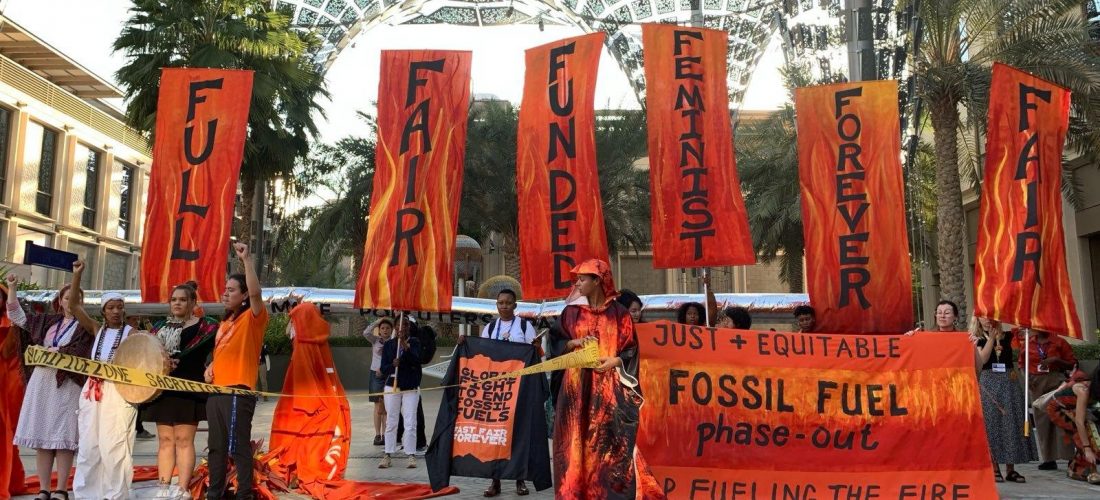
The mobilisations at COP have been instrumental in raising awareness of climate change and its devastating impacts. They have brought together people from different backgrounds to demand climate action from world leaders. The actions have also helped to create a sense of urgency around the issue of climate change, leading to increased political will to address the problem.
Citizens must be at the heart of the transition towards a more sustainable, fair and equitable future. This means that decision-makers must include citizens’ knowledge, needs, and input in policy-making processes which is not always easy to achieve.
To address this challenge, we believe that mobilisation is crucial. Mobilisation is the process of bringing people together to take collective action towards a common goal. In the context of COP and climate change, mobilisation can be a powerful tool for citizens to have a voice in the decision-making process and put pressure on negotiators to take action.
Shrinking space for civil society
Mobilisation is a powerful way to claim the space for civil society, particularly in social and geographical contexts where participation and freedom of expression are limited. This becomes even more important when we see civic space increasingly shrinking around the world and in Europe as well.
📢 Activists from all around the globe gather at #COP28 to #EndFossilFuels.
— CAN EUROPE (@CANEurope) December 5, 2023
🆘️ The world is burning, and so is our chance of limiting temperature rise to 1.5°C.
✊🏼 We need a Full, Fast, Fair, Forever, Funded, and Feminist phase out of all fossil fuels. pic.twitter.com/9dVHPD9G8s
Access to justice, democracy and meaningful participation are essential pillars we need to protect at COP, and mobilisation is an important way to do it. We also believe that civil society organisations, such as CAN Europe, can play a critical role in connecting different societal actors to influence decision-makers.
Today at #COP28, we call for countries to #FillTheFund on #LossAndDamage. ✊
— CAN EUROPE (@CANEurope) December 4, 2023
Here's what exactly needs to happen. 👇 pic.twitter.com/RSrZ9Lj6zq
We can witness the power of mobilisation and collective action in the context of COP28 at the moment, meaning it is demonstrated these days at COP28 in Dubai. Participants are expected to adhere to UN rules and not expose companies or call out countries. Despite the controlled environment for protesting, activists and civil society groups have been mobilising, protesting and chanting taglines at the Dubai Expo City in slots and locations allocated for them.
Creative tools for mobilisation
Clothes have become a tool for protest at COP, with certain colours being worn on certain days. For example, white represents human rights, yellow financial transition, and orange flames and fires of Fossil Fuels: living example of this was on Day 6 of COP28, the Energy and Industry Day, when activists and civil society actors from all around the globe gathered at Dubai Expo City to demand the phaseout of fossil fuels.
The world is burning around us, and there is a need to link the fossil phase-out to the negotiations and add pressure on the negotiators.
In conclusion, mobilisation is centred around the idea that citizens must be at the heart of the transition towards a more sustainable, fair and equitable future. Mobilisation is a crucial tool for citizens to have a voice in the decision-making process and put pressure on negotiators to take action. Civil society organisations, such as CAN Europe, can play a critical role in this process. By working together and taking collective action, we can create a powerful force for change.
Written by Pascual Polo, CAN Europe intern supporting our work on COP28
There is no more time left. ⏰
— CAN EUROPE (@CANEurope) December 5, 2023
No more time for greenwashing - no more time for distractions - no more time for unproven solutions. ❌
Our message at #COP28 is clear: #EndFossilFuels 👇 pic.twitter.com/lolmb9bhIV
❓WHAT DO WE WANT?
— CAN EUROPE (@CANEurope) December 4, 2023
✊🏽#FillTheFund!
❓WHEN DO WE WANT IT?
✊🏽 Now!!#LossAndDamage #COP28 pic.twitter.com/Z7aiEDJ27Z
For media: If you have an interview request, question or you would like to be added to the CAN Europe COP28 media list, please get in touch at communications@caneurope.org.



